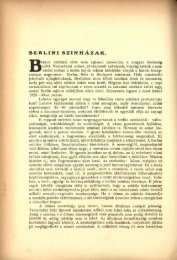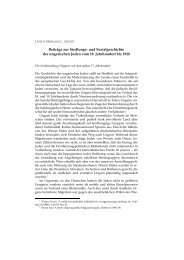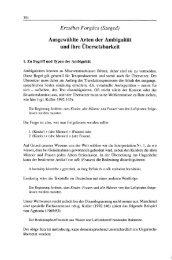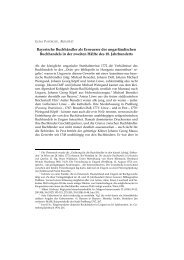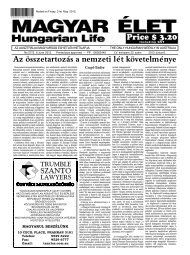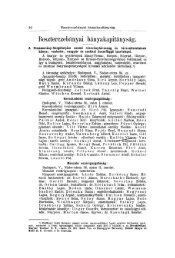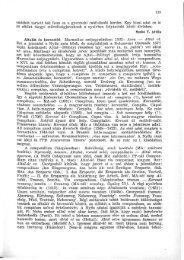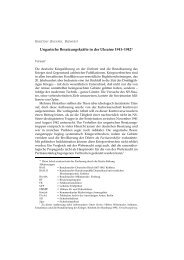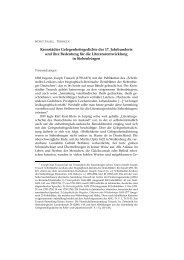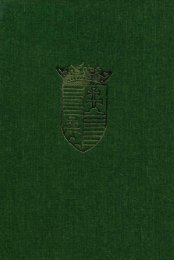hungarian studies - EPA - Országos Széchényi Könyvtár
hungarian studies - EPA - Országos Széchényi Könyvtár
hungarian studies - EPA - Országos Széchényi Könyvtár
Create successful ePaper yourself
Turn your PDF publications into a flip-book with our unique Google optimized e-Paper software.
26 LÁSZLÓ BORHI<br />
lion the following year. 131 The Hungarians did not count on the offer even though<br />
the Soviets had already sold their similar holdings in Bulgaria, Austria and Rumania<br />
and only the German ones remained in Russian hands. Due to the country's<br />
grave financial situation the Political Committee resolved to accept the Soviet<br />
offer, with the provision that Hungary would not be able to pay more in consultation<br />
fees and profit transfers in the forthcoming years than it had in the earlier<br />
period. Hungary announced that it wished to double the period of payment from<br />
the Soviet offer of five years to ten years and that it wanted to purchase the joint<br />
oil company as well. 132 Gerő then transmitted the Hungarian offer to the Soviet<br />
economic advisor in Hungary, Nikolaenko, who had made the original offer to the<br />
Hungarian government. The Kremlin's answer reiterated the original Soviet position,<br />
with the exception that 50% of the payments would be used in Hungary. 133<br />
Budapest tried to have the Soviets accept an eight-year term for payment and also<br />
desired that the Soviet Union omit a clause from the proposed agreement according<br />
to which Hungary would have to take responsibility for all further claims<br />
against the joint companies. 134 The latter provision caused serious problems when<br />
an Austrian-Hungarian treaty was being negotiated, since the Soviet Union, abusing<br />
the terms of the Potsdam Declaration, had taken over properties that had belonged<br />
to Austria. The Soviets made a few additional concessions: according to<br />
the treaty the Soviets agreed to sell the joint oil company, but insisted that they<br />
receive the payment of 2-2.5 billion forints in growing instalments over five years<br />
starting in 1955. Furthermore, Moscow disclaimed all responsibility for any future<br />
claims against these companies. 135 Although the re-acquisition of the joint<br />
companies returned economic sovereignty to Hungary, the exploitation of its natural<br />
resources continued with the Soviet exploitation of Hungarian uranium.<br />
The exploration for Hungarian uranium resources by Soviet experts began in<br />
1953. At this time the Soviet nuclear weapons program started to expand rapidly.<br />
Reserves that had been found in some people's democracies, such as the GDR,<br />
Czechoslovakia and Bulgaria, were already being exploited for the USSR's purposes.<br />
Large deposits were found in the Mecsek Mountains in southern Hungary.<br />
According to the preliminary estimates the reserve contained fifteen million tons<br />
of ore, which made it one of the largest deposits in the world. The uranium content<br />
of the discovery, on the other hand, was considered to be average. 136 Well after the<br />
exploitation of this resource had actually begun, the two countries signed a protocol<br />
on June 8,1955, which regulated the reserve's future exploration, exploitation<br />
and sale. This colonial style agreement granted the USSR exclusive rights. The<br />
treaty provided for the exploration for radioactive elements and for their production<br />
to begin even while the exploration continued. The Hungarian government<br />
was obligated to place the sites free of charge at the geological expedition's disposal<br />
and to exempt the equipment imported by the Soviets, as well as the ore


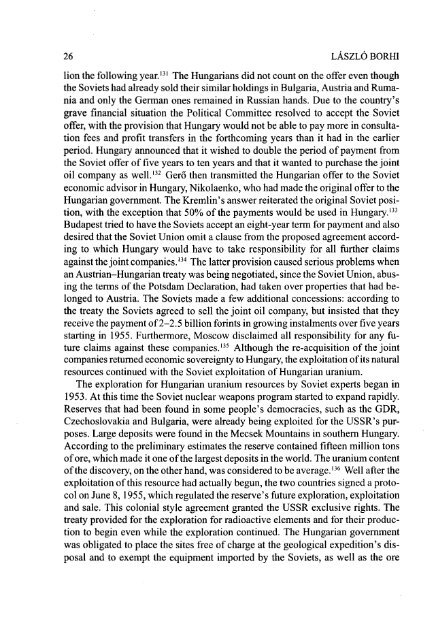
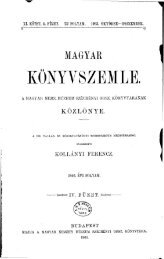
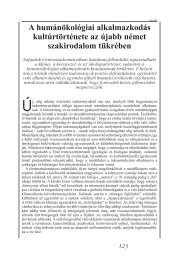
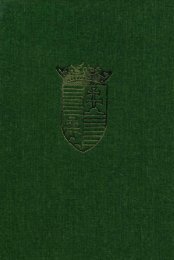
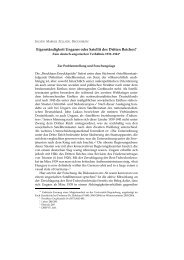
![Letöltés egy fájlban [36.8 MB - PDF] - EPA](https://img.yumpu.com/23369116/1/172x260/letoltes-egy-fajlban-368-mb-pdf-epa.jpg?quality=85)
